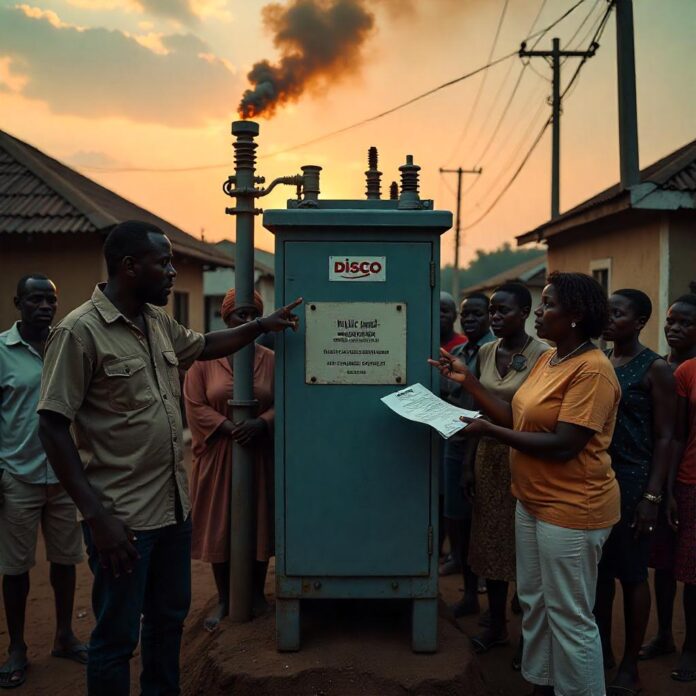A high-stakes legislative revolt is challenging Nigeria’s broken electricity model. Amidst soaring tariffs and worsening blackouts, the Senate has issued a damning indictment: stop using public funds to enrich private electricity distribution companies. Senator Yunus Akintunde crystallized the injustice: When you buy a transformer with government money and hand it to a community, the distribution company still insists on installation fees. Once energised, it becomes their asset. That’s public money building private monopolies. This article dissects Nigeria’s power crisis, where ₦4 trillion in subsidies and crumbling infrastructure collide with corporate exploitation.
The Core Conflict: Public Funds, Private Profits
Imagine your community pooling resources or using government grants to buy an electricity transformer. Now picture the DISCO charging you ₦800,000 to install it—then seizing ownership once it’s operational. This isn’t fiction; it’s standard practice across Nigeria. DISCOs profit twice: from installation fees and permanent ownership of publicly funded assets. Communities lose control, DISCOs expand their portfolio, and taxpayers foot the bill for private gain.
In 2024 alone, the Federal Government injected ₦1.94 trillion in electricity subsidies. Yet tariffs keep rising, and outages worsen. Why? Subsidies prop up DISCO balance sheets instead of lowering consumer costs or upgrading infrastructure. The Senate reveals DISCOs treat subsidies as revenue—not reinvestment capital—while remitting as little as 30% of power purchase invoices to generating companies.
Akintunde, Nigeria’s first PhD holder in Energy and Environmental Studies, dismantles the anti-subsidy argument: There is nowhere in the world where power is not subsidised—even in the UK. We cannot abandon subsidies because of past mismanagement. The issue isn’t subsidies per se; it’s how Nigeria implements them. In advanced economies, subsidies shield consumers. Here, they inflate DISCO profits.
DISCOs: The Weakest Link in the Power Chain
Power Minister Adebayo Adelabu minced no words: DISCOs are the sector’s weakest link. Data exposes shocking inefficiency: Northern DISCOs remitted just ₦124.4 billion of their ₦408.86 billion invoice—a 30% payment rate. Over 70% of DISCO revenues originate from Lagos and Abuja, abandoning rural networks to decay. Only 75,000 meters were deployed by April 2025 under the ₦700 billion Presidential Metering Initiative, leaving 4.3 million households without accurate billing.
Privatisation was meant to attract expertise and investment. Instead, DISCOs secured licenses through phantom technical partnerships, used loans to buy assets, then diverted revenue to service debts—not grid upgrades. Senator Garba Maidoki blasted their impunity: DISCOs ignore Senate resolutions, overcharge consumers, and owe gas suppliers for five years. Even senators struggle to pay fraudulent bills.
Legislative Shockwaves: The 2025 Electricity Act Amendment
Sponsored by Senator Enyinnaya Abaribe, the Electricity Act (Amendment) Bill, 2025, passed its second reading as a legislative defibrillator for the dying power sector. Its radical provisions include: Criminalizing infrastructure vandalism with penalties up to capital punishment for repeat offenders; Redirecting subsidies from DISCO bailouts to consumer-focused initiatives like the Power Consumer Assistance Fund; Clarifying state regulatory authority post-2023 Electricity Act, ending jurisdictional clashes between NERC and state agencies.
Most critically, the bill mandates: publicly funded assets remain public property. Transformers bought by communities or governments will no longer become DISCO assets. This ends the double-dip exploitation model. Akintunde highlighted the sector’s fatal flaw: Generation and distribution are privatised, but transmission remains government-controlled—and obsolete. Over 45% of generated power dissipates through dilapidated lines and substations incapable of handling modern loads. The bill pushes public-private partnerships to modernize this grid.
Beyond Rhetoric: Expert Analysis & Stakeholder Wars
Though DISCOs avoided Senate testimony, their arguments lurk in policy debates: Tariff caps prevent cost recovery; Theft and non-payment cripple finances; Gas price volatility and transmission failures make reliable supply impossible.
The Power Minister’s threat resonates: We will soon restructure underperforming DISCOs. Options include license revocation, forced mergers, or inviting technical partners to replace equity holders. Dr. Idowu Oyebanjo warns constant legislative changes erode investor confidence: Amending the 2023 Electricity Act so soon risks capital flight. Yet lawmakers counter that without reform, total sector collapse is inevitable.
Pathways to Reform: Solutions on the Table
The Senate’s blueprint shifts subsidies away from DISCOs toward: Direct bill support for low-income households via the Power Consumer Assistance Fund; Public infrastructure OWNED by communities, not DISCOs; Accelerated metering using subsidy funds to close the 4.3 million gap.
Regionalize networks: Merge DISCOs into zones reflecting economic realities; Deploy armed forces to protect substations and lines from vandals; Revoke licenses of DISCOs failing remittance or grid investment targets.
The 2023 Electricity Act enables states to regulate their markets. The amendment accelerates this by: Letting states issue distribution licenses; Supporting mini-grids for rural communities; Setting localized tariffs based on actual supply costs.
Real-Life Impact: Voices from the Ground
Lagos Business Owner: We pay ₦250,000 monthly for diesel despite DISCO bills. Why subsidize companies when we fund our own power? Kano Resident: Our local government donated a transformer last year. DISCO made us pay ₦800k to install it, then took ownership. Now they charge us for faults! Abuja Mechanic: Three years without a meter. Estimated bills crush my profits. I shut down my workshop last month.
The Road Ahead: Will the Senate’s Fire Ignite Change?
The Power Committee has six weeks to refine the bill before plenary voting. Key battles loom: Defining capital punishment for vandals without violating human rights norms; Ensuring states have technical capacity to regulate electricity; Phasing out DISCO subsidies without causing service collapse.
Senator Akintunde’s plea captures the mission: Stop enriching monopolies. Empower Nigerians with affordable, reliable electricity. Success means transformers owned by communities, meters in every home, and DISCOs forced to perform—or perish.
Nigeria’s electricity bill debate exposes a painful truth: public funds are financing private opulence while citizens languish in darkness. The Senate’s demand to stop subsidizing DISCO assets isn’t just policy—it’s a moral reckoning. As legislative battles intensify, consumers await tangible outcomes: meters that end billing fraud, transformers owned by communities, and DISCOs forced to perform or perish. Until then, the only current flowing freely is the money powering DISCO profits.


